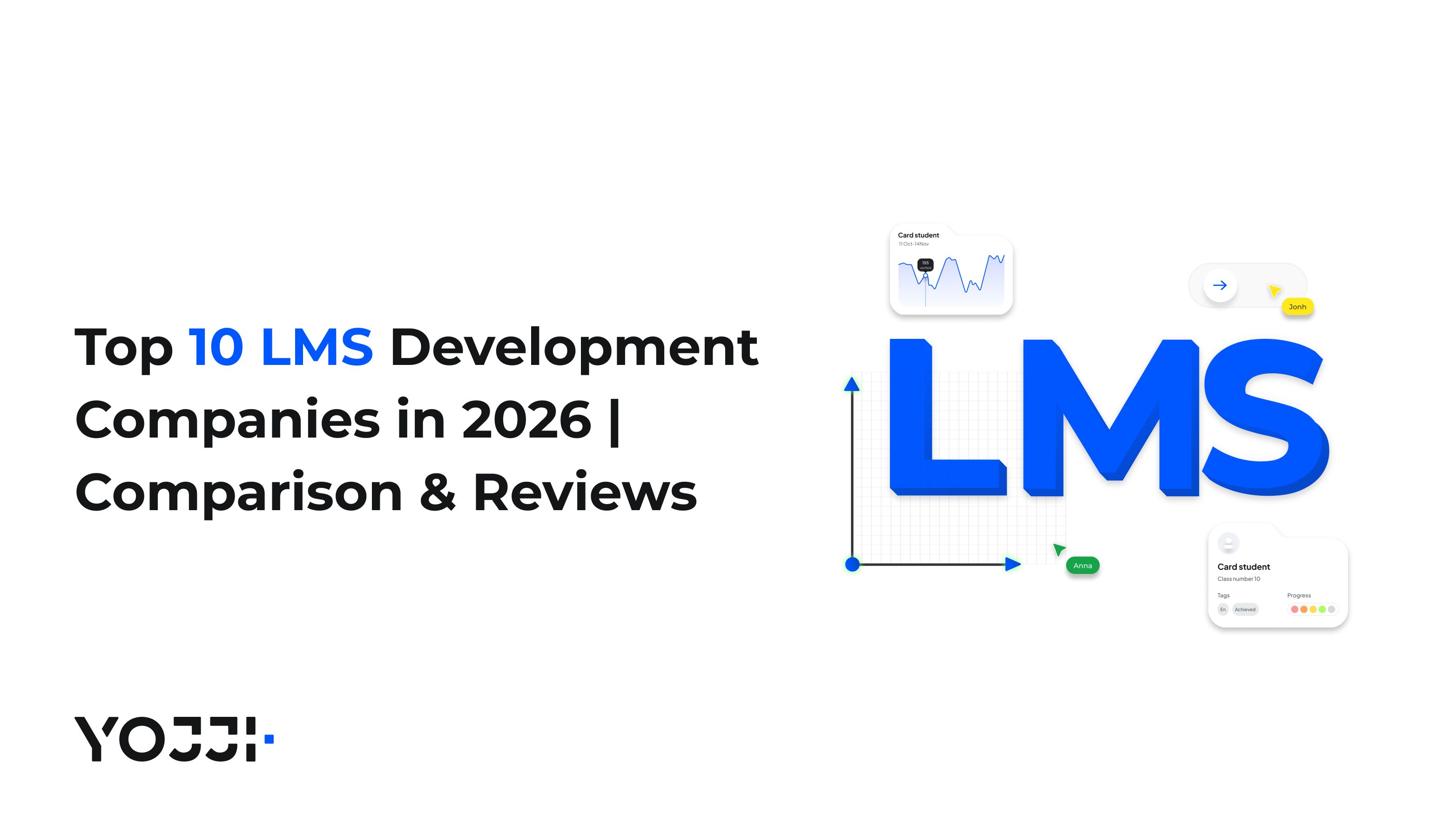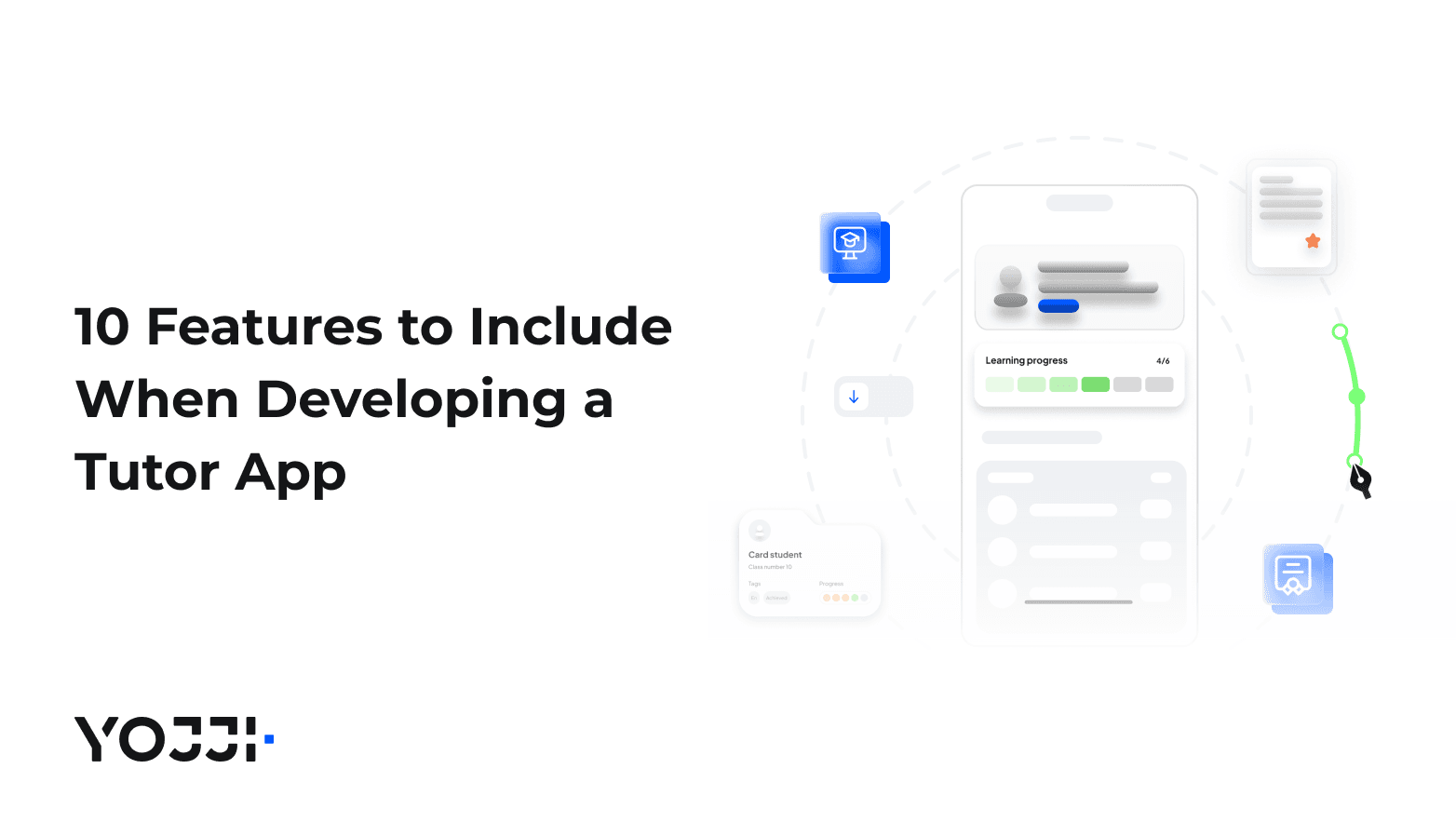Tips for Building a Real Estate Website

According to statistics, 51% of buyers found the home they purchased on the Internet. Besides, the real estate market grew by 0.4%, and there are tendencies for further growth. So, if you run a real estate business and want to stay ahead of the competition, going digital is not an option, it is a must.
Today, a professional website is a top-selling tool for every agent because, unlike social media channels, it provides complete control and customization. Therefore, agents can promote their services in the best possible way.
Some real estate agents think that creating and maintaining a website is too difficult and expensive, but in this article, we will debunk this myth. Besides, we will explain why you should have your own website and what features it should contain.
Why You Should Invest in Creating a Real Estate Website
You probably know that realtors are looking for new opportunities for real estate development and increasing their digital presence, and creating a real estate website is one of these opportunities. Despite the high competition, your real estate website can be an excellent platform for your scalability, expanding your customer audience, and increasing your profits. Below, we list the main advantages of establishing a website for realtors.
Attracting potential customers
Building a website will help you retain existing customers and attract new ones. Make sure your site has high traffic. To do this, dedicate time to its optimization, work on the visual component and user-friendliness, and publish only helpful and relevant content.
Developing a positive self-image and reputation
Clients trust reliable real estate agents with an impeccable reputation. Build trust and strengthen your reputation by showcasing your expertise, sharing the projects you’ve worked on, your accomplishments, awards, and personalized content.
Brand recognition
Every real estate agent is a brand that conveys a specific message to existing and potential clients. The website helps maintain the brand by increasing awareness among the target audience. Various methods are used to raise awareness, for instance:
- Advertising.
- Constant communication with the audience - answers to questions, giving feedback to clients who published their reviews, as well as providing information support to clients.
- Partnering with influencers to promote your services.
Saving time
Realtors in most cases live on a tight schedule - they go to real estate, prepare all the documents needed for a deal, conclude deals, keep in touch with clients afterward. A feature-rich website will help you perform all the functions in a more effective way.
For example, there will be no need to waste time on physical presence because your website can provide high-quality photographs and a 360-degree view of the object. Besides, accepting new applications and communicating with existing customers can be done using the online form on the website.
Improving customer convenience
On your website, you post up-to-date information about a property in a specific area, so your clients can get all the information they need about the property for sale at any time they want.
Types of Real Estate Websites
There are various types of real estate websites to choose from. We will briefly describe them.
Promotion website
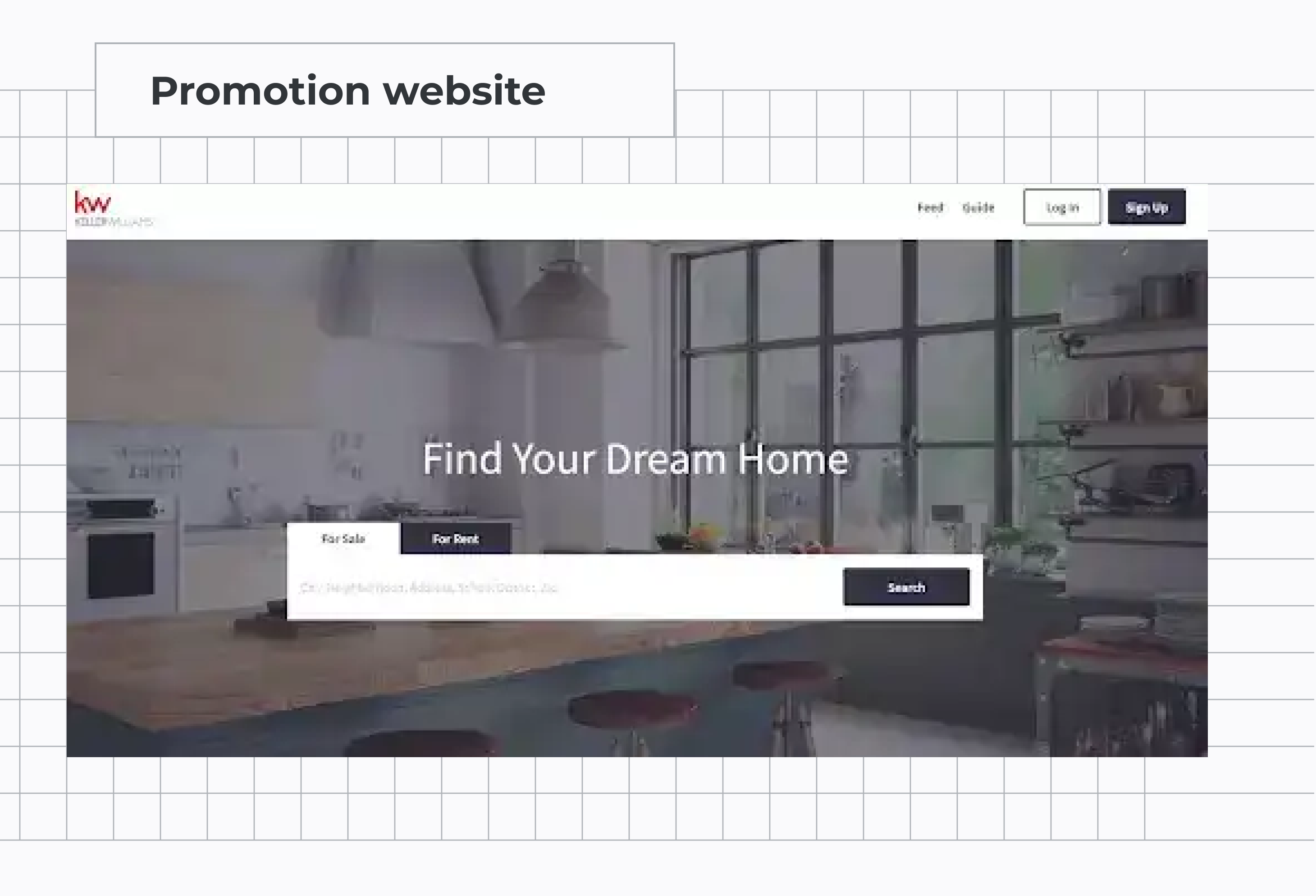
On these websites, a company advertises its services, publishes property offers, and gives tips and support.
Property portal
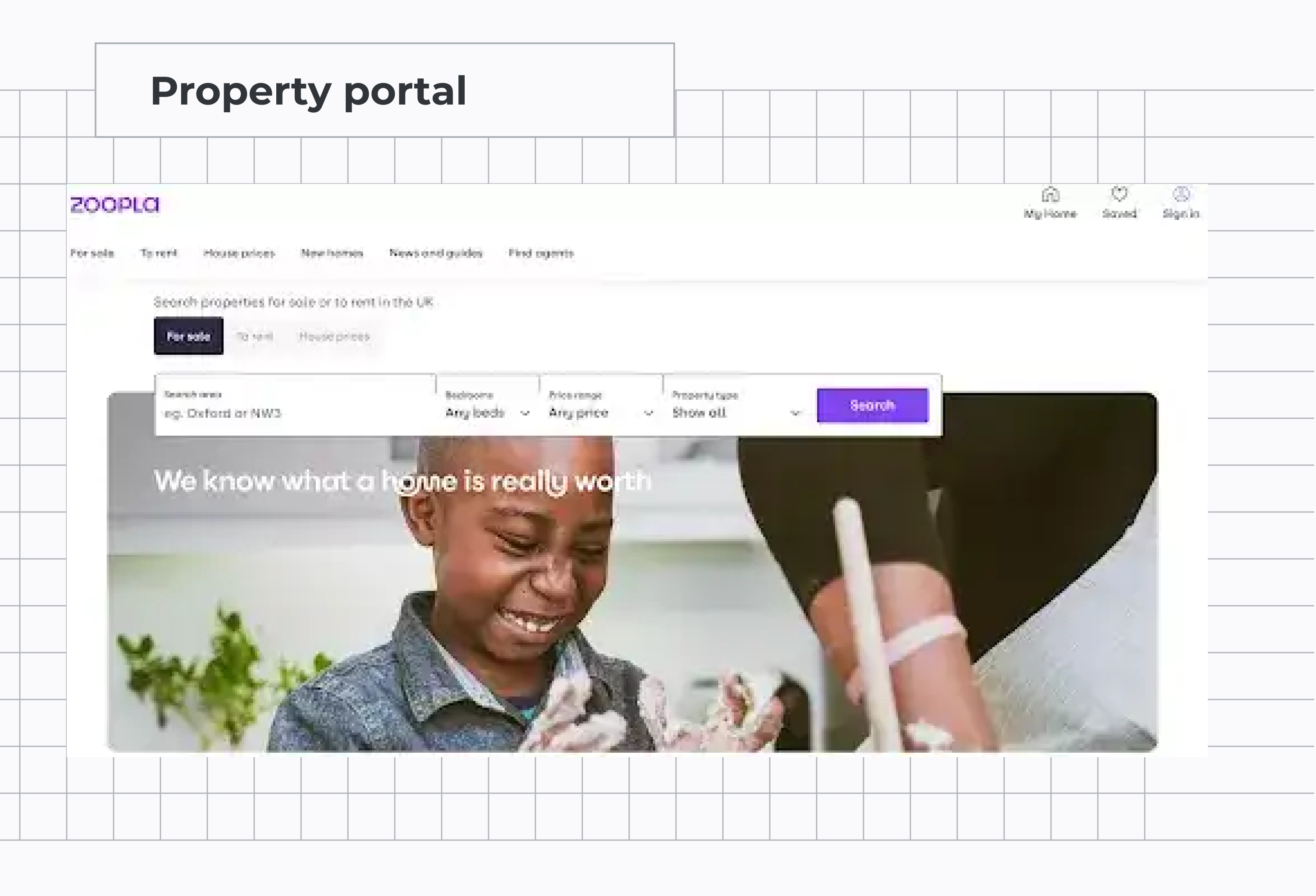
On these platforms, users can find homes for sale or rent. However, listings can only be posted with the help of an agent.
Real estate marketplace
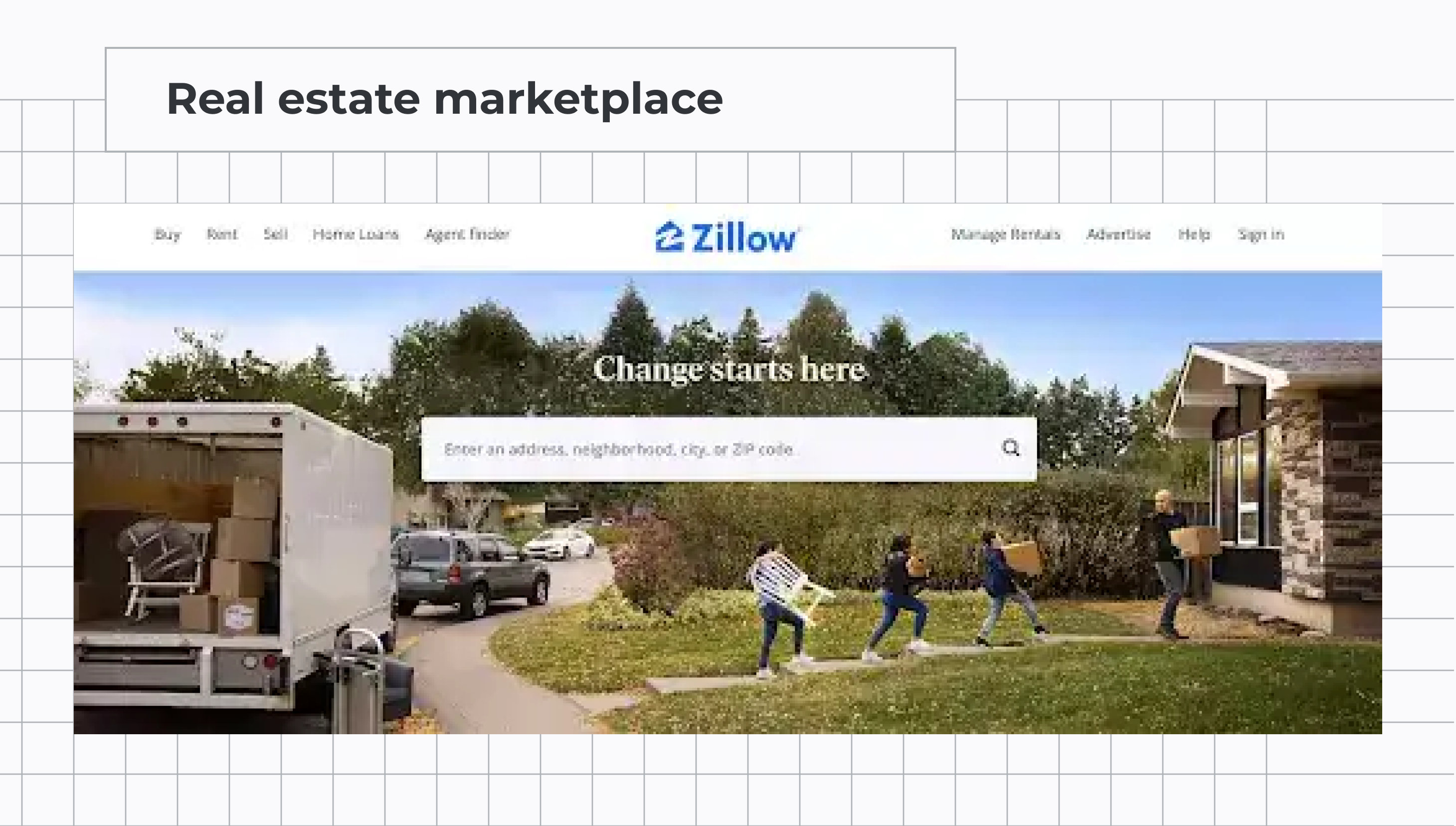
The real estate marketplace is an online platform that connects realtors, brokers, and property managers with their customers. Sellers and buyers have access to various features. For example, they can post their listings, use a real estate estimation feature, view property information, and search for property to buy or rent.
Property management website
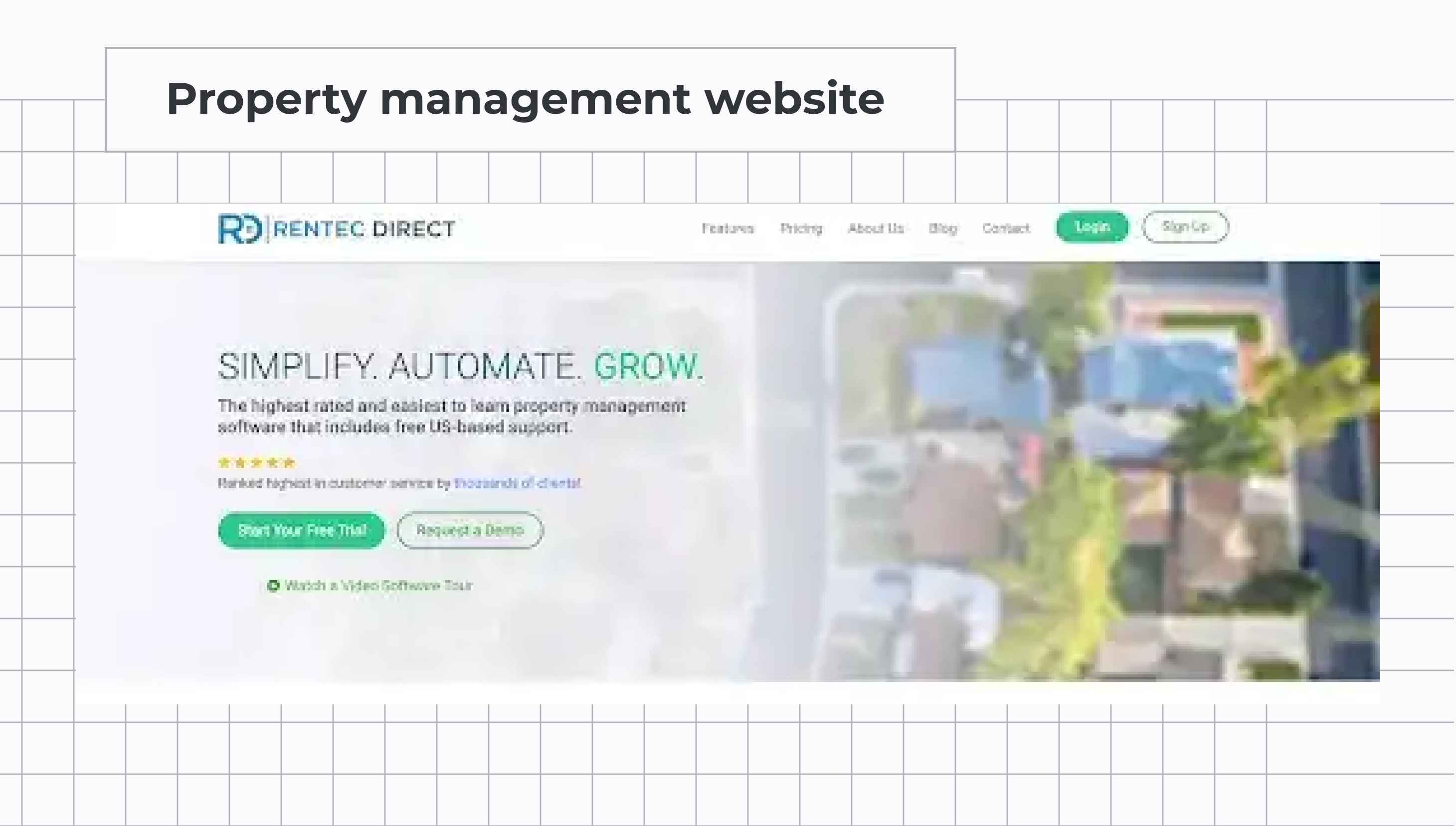
These sites can be targeted at both residential and commercial real estate. They provide various functions for property owners such as accounting, property management, tenant selection, reporting, rent payment and payment control system, lease renewal workflow, etc.
Real estate investing website
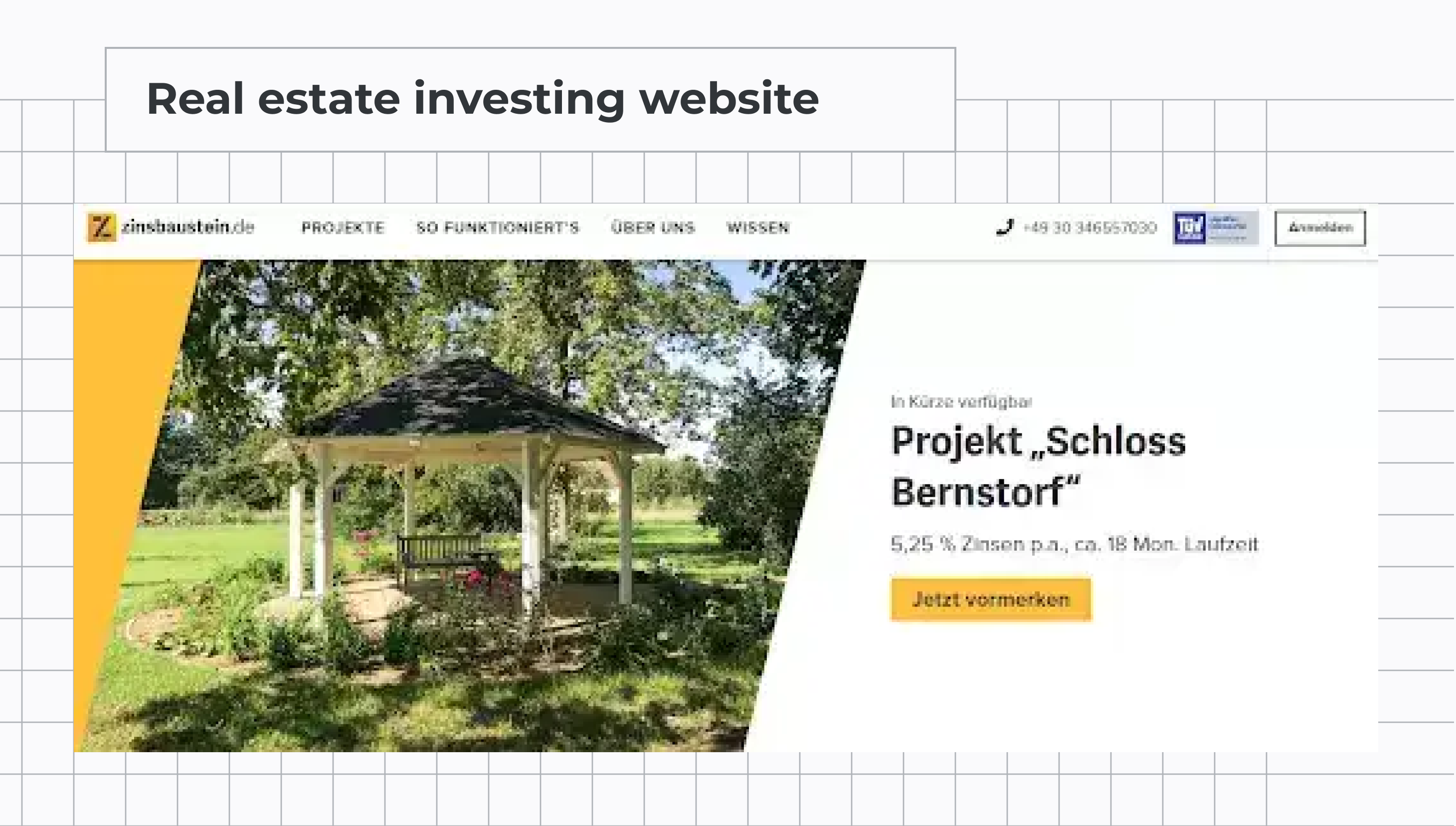
These websites offer investors passive income and reliable long-term investment. Shareholders can find interesting options for investment (properties under construction, houses at discounted prices, etc.)
Real estate aggregator
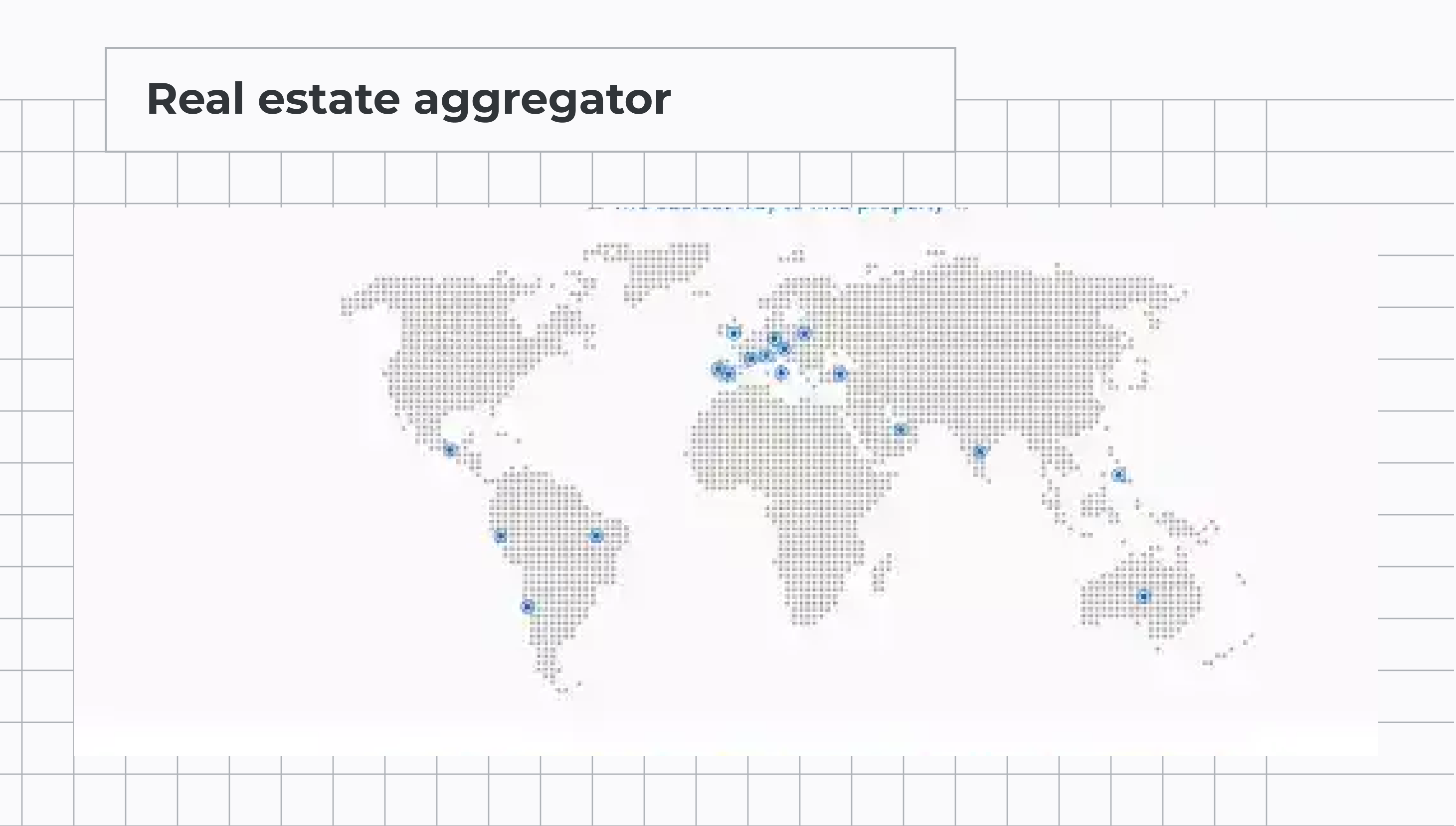
This type of platform displays data collected from different websites. Real estate aggregator websites are user-friendly as they offer a variety of real estate options and easy-to-use filters for an efficient search.
Basic and Advanced Features of a Real Estate Website
Every real estate website has both basic components that make up its backbone and make sure your website is search-engine-friendly and advanced features that enhance user experience. We will focus on the main features your real estate website should have.
Sign Up
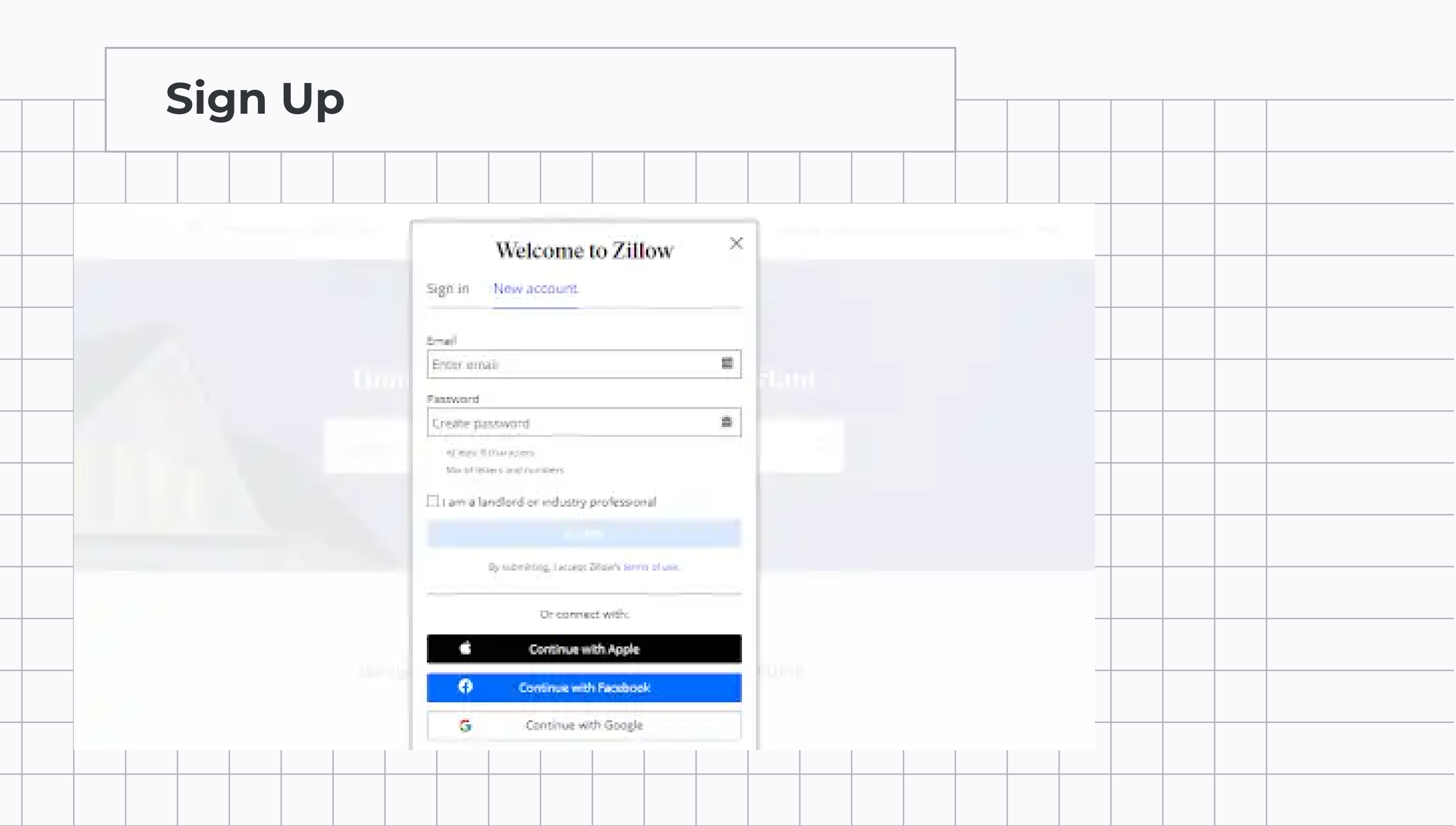
Signing up is a great tool for website optimization (it provides a detailed overview of your target audience) and marketing campaigns, as you can use email addresses to create advertising campaigns and send out new offers and promotions. It is very important to pay special attention to the sign-up form - it should be as simple and straightforward as possible. Also, make sure the users don’t spend much time signing up. To do this, add the ability to register and log into an account using Facebook/Google/phone number.
Live search
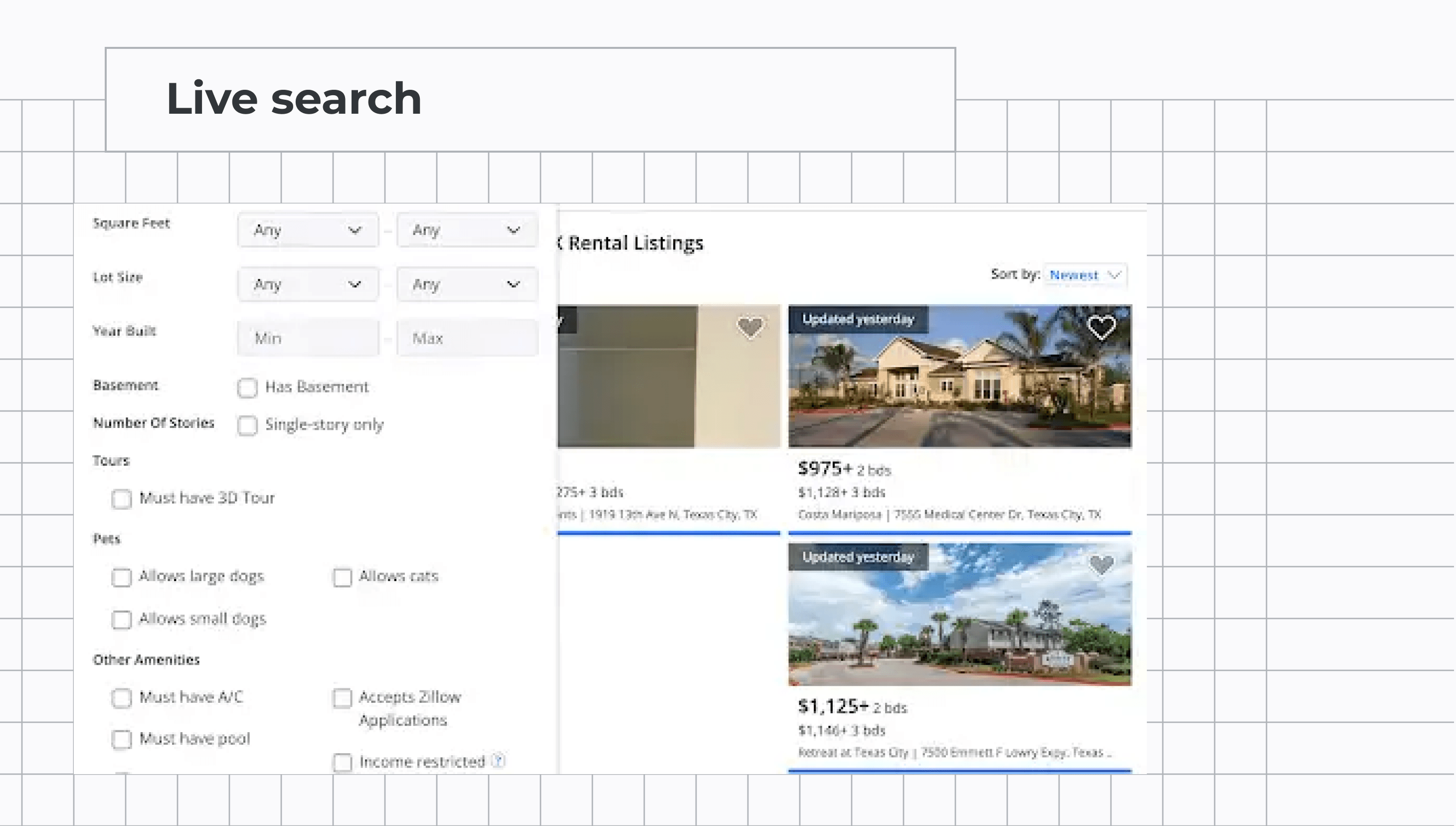
To make your site as user-friendly as possible, you must provide the most thoughtful search possible. Choose the full range of filters that contribute to accurate results. For instance, search boundaries (specific area), type of listing (rent, purchase, sale), house type, cost, year of construction, number of bedrooms and bathrooms, amenities, the view, etc. You also need to add sorting options such as price, newest, bedrooms, square foot, number of photos, and mortgage.
High-quality images for every property
The visual aspect of a website is very important as it engages potential tenants or buyers. According to statistics, homes with high-quality photography sell 32 percent faster. Besides, homes with more photos sell faster, too. A home with one photo spends an average 70 days on the market, but a home with 20 photos spends 32 days on the market. Thus, professional HD images will improve the interaction with your site visitors and lead to better deals.
Property listing page
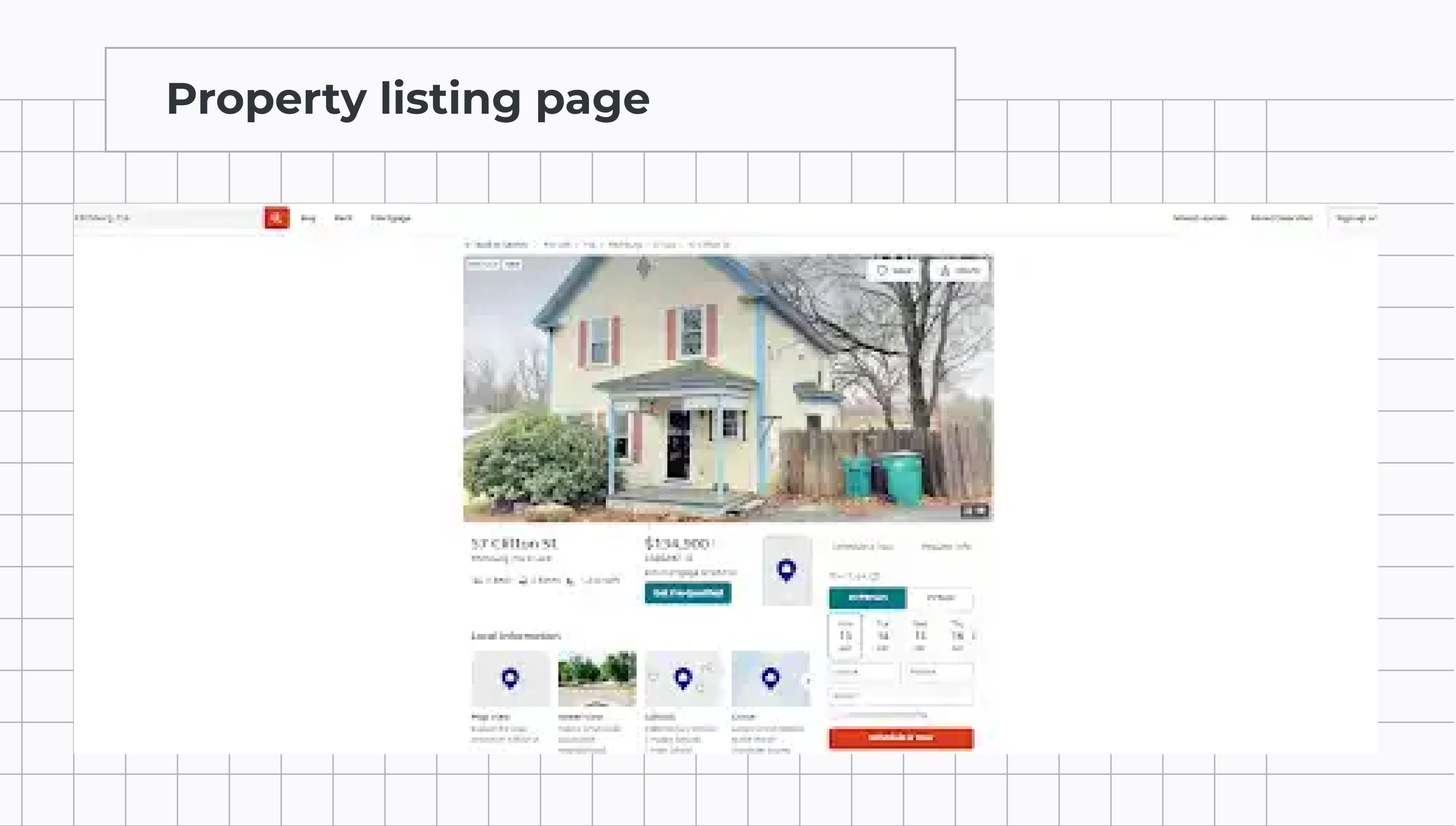
The property page should feature a combination of a great design and usability to maximum effect. Usually, it contains the following information:
- Photo of the object
- Embedded map
- Peculiarities
- Listing author
- Contacts
- Floor plan
- Building overview
- Infrastructure information: shops, schools, etc.
- Ratings of the area in which the facility is located
- Availability
- Price trends
Besides, sharing buttons should be integrated, so that users can easily share listings.
Property posting
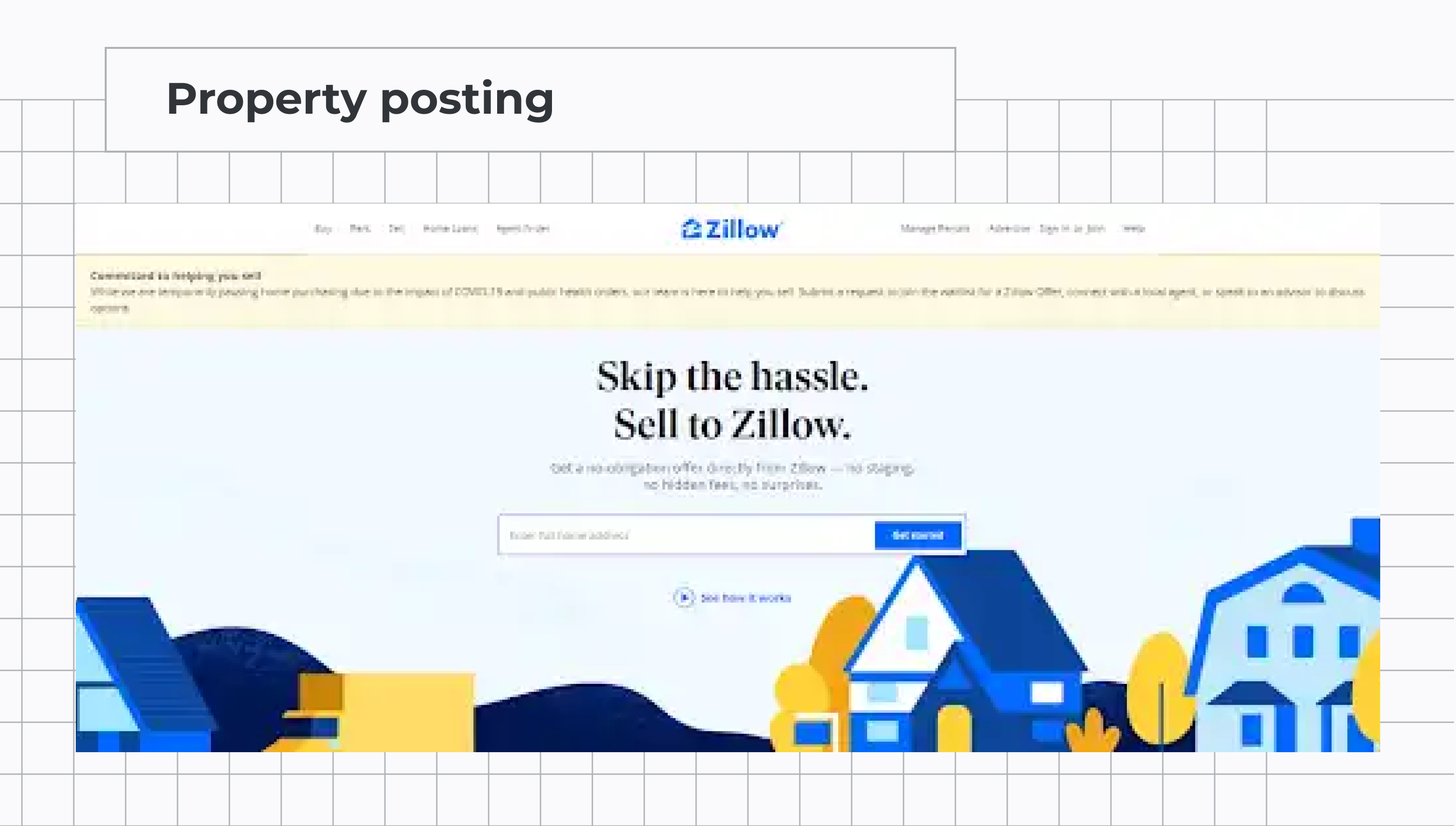
A property posting feature is one of the highlights that make a website attract attention. It is necessary to make the process of publishing and editing a listing as clear and simple as possible. Provide the following functions: select the type of listing (sale or rent), an opportunity to add address, city, postal code, cost, description, and contact details. Besides, the function to attach HD photos and virtual tour URLs is the feature that will help the site stand out from the competition.
Virtual tours
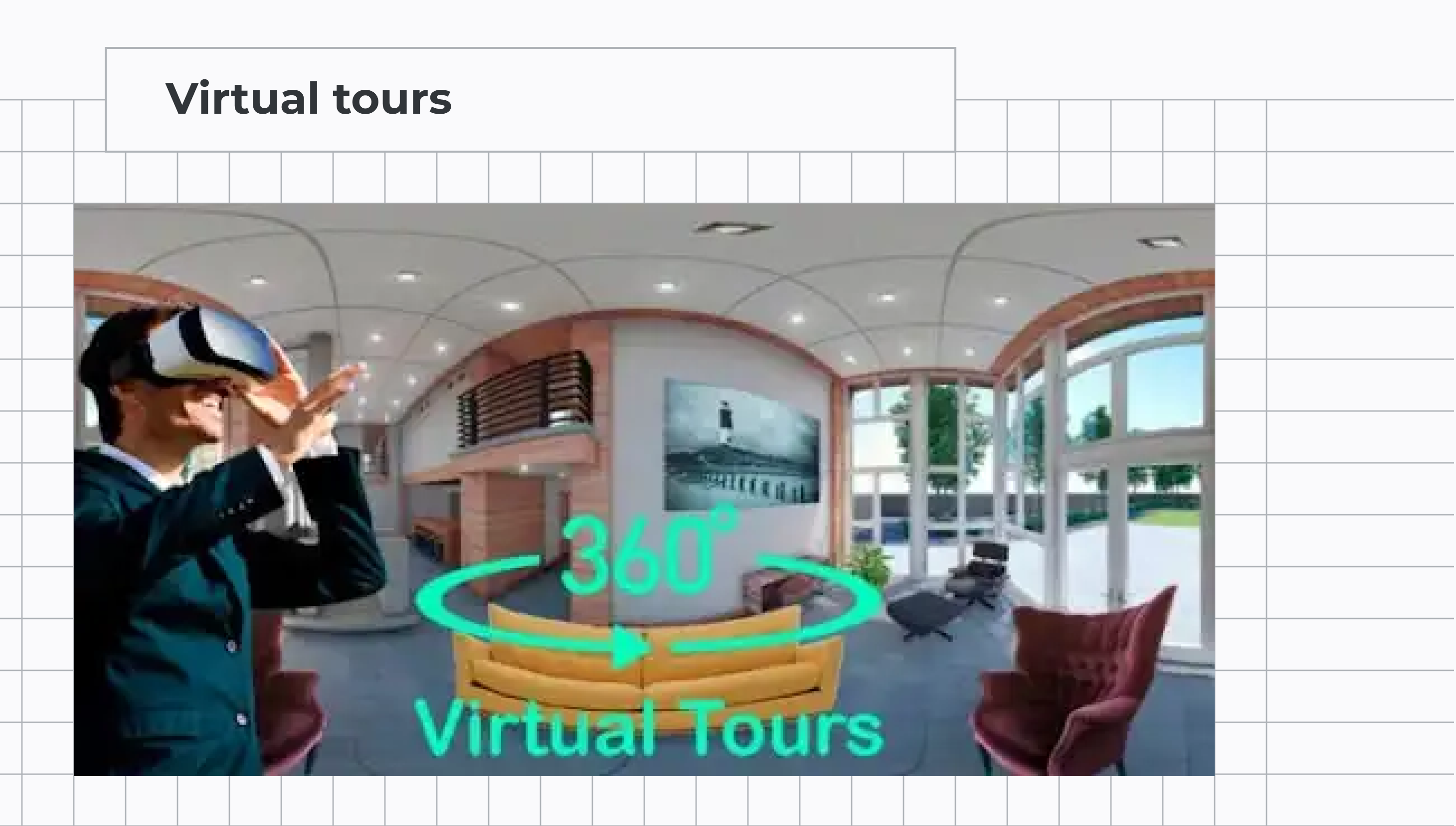
A detailed tour of the property can convey a complete picture, so it will be an excellent alternative to high-quality images. You can provide a detailed video overview or allow users to explore the object using virtual reality and augmented reality technologies. This immersive experience allows the customers to see the house in the same way as in real life. These methods will provide comprehensive information about the interior and exterior.
Messaging tool
If a buyer or tenant has questions, then all issues can be clarified directly with an agent. To organize communication between two parties, you can choose several options: a live chat, a system for direct exchange of text/voice/video messages.
Listing system
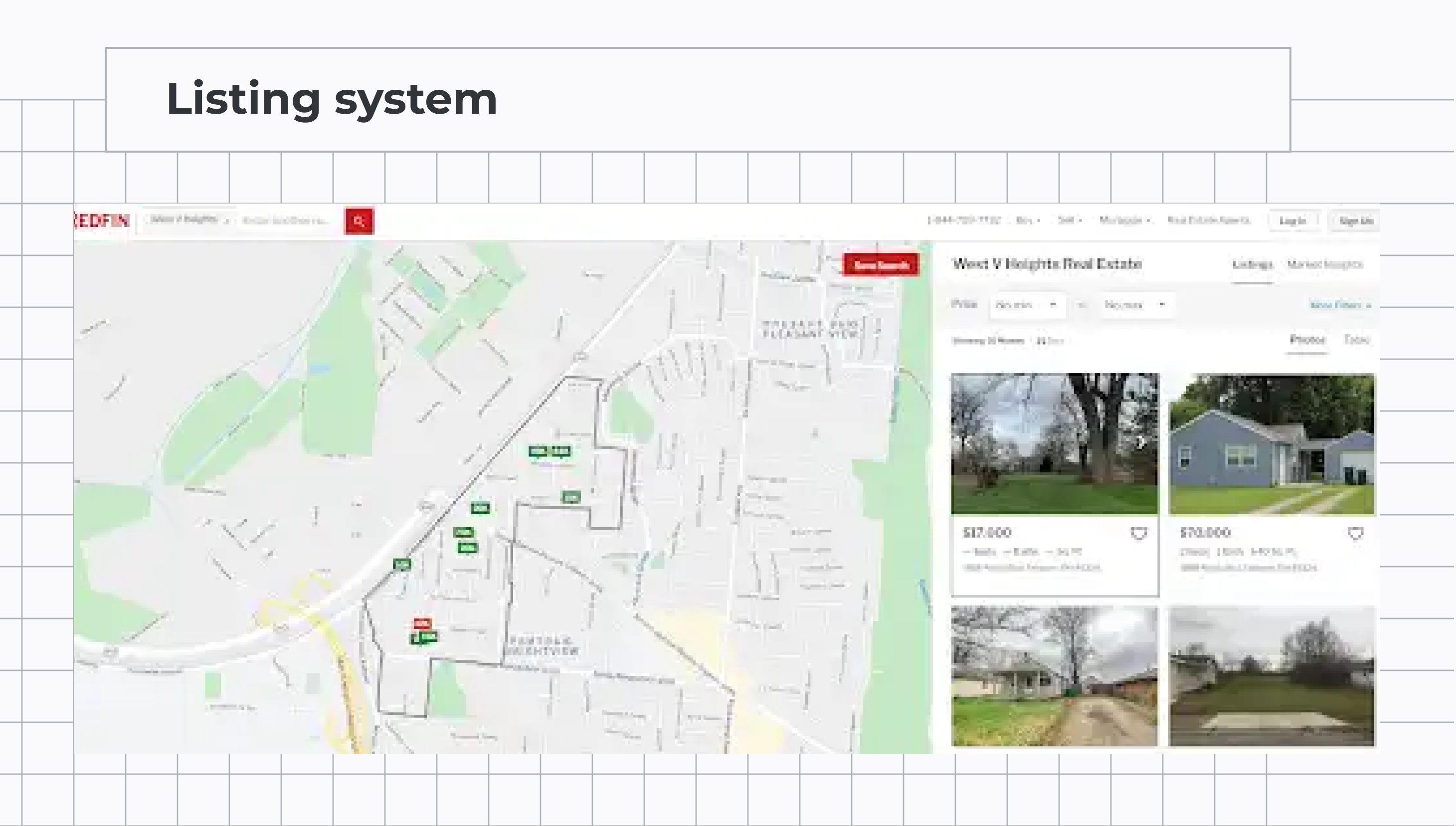
The listing system should be user-friendly. Often, listings are published in the form of a table or a list with icons (photos). A great option is a combination of a map on one side and a list of listings in the form of photographs on the other side. On the map, the color-coding of areas in the city can be indicated (a bad, very bad, neutral, good, or excellent area will correspond to a certain color). Also, the map can display demographic data, crime rate, and the average housing prices in a particular area.
Real estate estimation
Real estate evaluation is one of the most important functions for tenants and sellers. This feature allows you to estimate the value of an object using available statistics, big data, and machine learning technologies. The margin of error is 7%.
Besides, it is also a great idea to implement a calculator function for buyers. It allows them to calculate the cost of a mortgage based on various parameters: annual family income, salary, other income, mortgage term, interest rate, etc. Therefore, families will be able to make a purchasing decision.
Calendar
This tool will allow users to check availability with real estate agents and allow them to schedule appointments to look over the property.
How to Monetize a Real Estate Listing Website
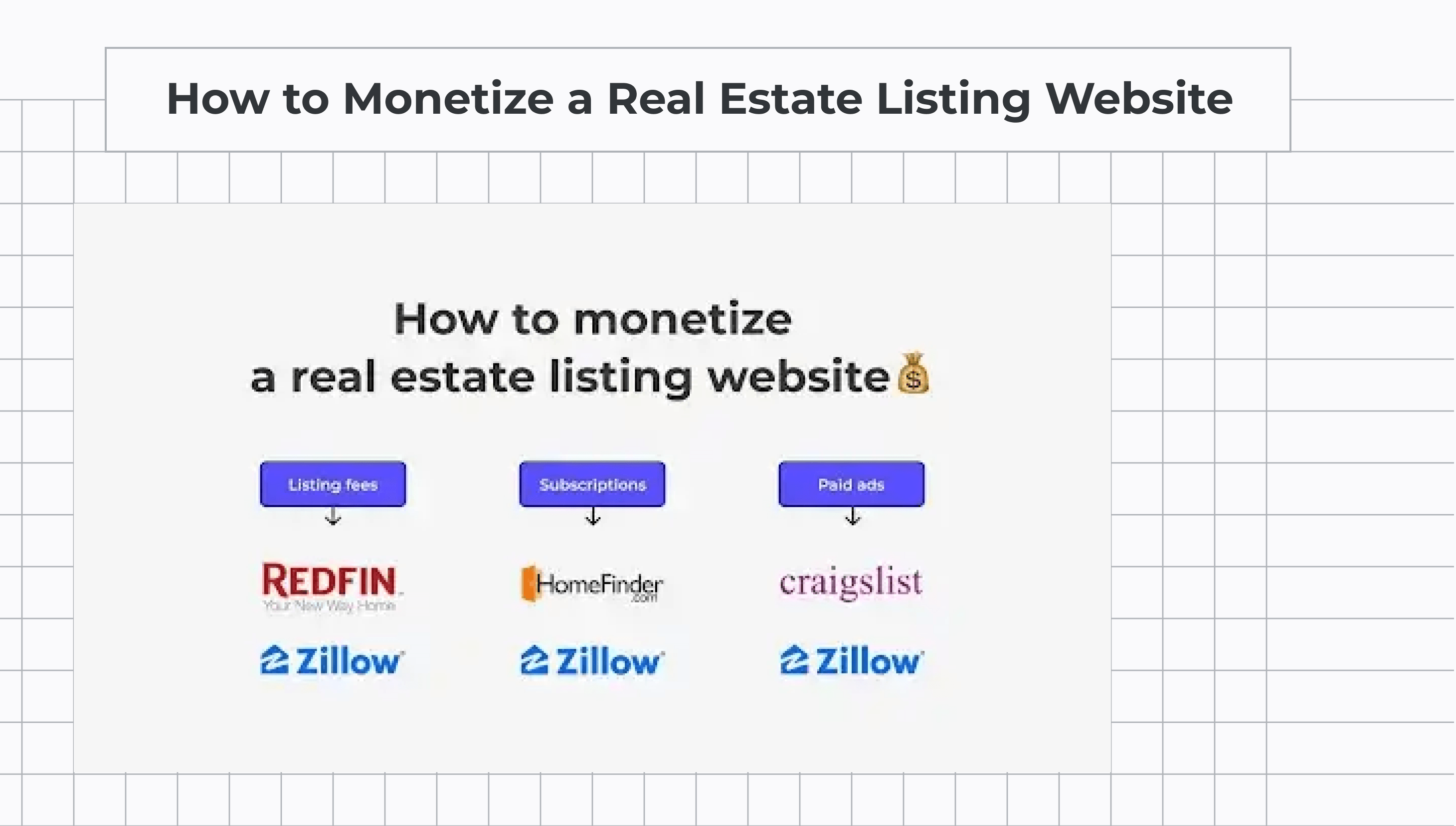
Three main monetization models are distinguished.
1. Listing fees
Sites that use this monetization strategy allow sellers to list homes with a 1% commission, instantly contact a real estate agent, and sell real estate on short notice with professional help.
2. Subscriptions
This model involves the payment of a monthly or annual fixed fee for the use of a website. This price includes the publication of a limited or unlimited number of listings.
3. Paid ads
Websites promote offers from sellers and buyers on their platform and make them more visible to a target audience. However, there is one example that is worth mentioning because it takes a creative approach towards typical monetization strategies. Zillow is a platform that is free for all users, but it earns money in different ways:
- Property management companies may place ads on the platform.
- Real estate agents may promote their local listings for money.
- Zillow buys and resells homes on its own.
Real Estate Website Development Stages
Developers work on the project in several stages. Namely:
1.Discovery stage
At this stage, a team analyzes the business, defines the goals and the target audience, decides on the features you want your website to be packed with, maps user stories, and plans the possible revenue.
2. Idea validation
Different techniques (competitor research, various surveys, different methods of economic analysis, and medium-fidelity prototype testing) are used.
3. UX and UI
Engineers work on creating wireframes, layouts, and high-fidelity prototypes.
4. Development
The development of a product takes place. Engineers choose an appropriate tech stack and break down the process into sprints (stages).
5. Quality assurance
Quality assurance engineers conduct various testing types to make sure a website is functional, easy to navigate, and offers a great user experience.
Frequently Asked Questions
- How much does a real estate website cost?
We cannot set a predetermined price because there is a plethora of nuances that influence the final price. The major parameters that influence a real estate website cost involve the scope of work, the size of the team working on the project, the qualification, and the location of team members. The cost of a project starts at $17,000. However, it is necessary to specify the cost for every project.
- Real estate website builders vs custom real estate website development - what to choose?
Though using real estate website builders has several advantages (they are responsive and mobile-friendly, there is a variety of templates to choose from, and these builders don’t require special knowledge or coding skills), they provide only a limited set of features, and ready-made designs are static. Therefore, if you want to meet the unique expectations of your audience, adopt the newest trends in real estate development and design, go for custom website development. A Yojji team will be glad to assist you to solve all the challenges and provide effective business solutions. If you require any further information, feel free to contact us.
Conclusion
A real estate website enables real estate agents to promote their business, gain audience trust, and carry out residential and commercial real estate transactions more efficiently. However, to create an optimized website, it is best to turn to a team of highly skilled programmers and designers in order to get a great site that satisfies all the needs of your customers and helps you grow your business and strengthen your brand.
Looking to hire developers?

